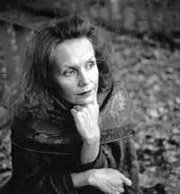 By far, the most exciting event of the Santa Fe Opera season is the American premiere of Kaija Saariaho's new opera, Adriana Mater. Santa Fe introduced American audiences to the extraordinary L'amour de loin, the Finnish composer's first opera, and it was naturally expected that she would return to New Mexico with her second. Saariaho was reunited with the "dream team" of L'amour de loin, librettist Amin Maalouf and director Peter Sellars, for a story that is as unlike that medieval romance as possible. Set in an unspecified country at war, the parallels with the Bosnian-Serbian conflict are overpowering, but its story of a woman being raped, giving birth to a child, and the inevitable chain of violence that follows that child is found, unfortunately, in many places.
By far, the most exciting event of the Santa Fe Opera season is the American premiere of Kaija Saariaho's new opera, Adriana Mater. Santa Fe introduced American audiences to the extraordinary L'amour de loin, the Finnish composer's first opera, and it was naturally expected that she would return to New Mexico with her second. Saariaho was reunited with the "dream team" of L'amour de loin, librettist Amin Maalouf and director Peter Sellars, for a story that is as unlike that medieval romance as possible. Set in an unspecified country at war, the parallels with the Bosnian-Serbian conflict are overpowering, but its story of a woman being raped, giving birth to a child, and the inevitable chain of violence that follows that child is found, unfortunately, in many places.The premiere of the opera at the Bastille was nearly scuttled, but fortunately only delayed by strikes. The critical reception of the premiere was mixed, with some very harsh criticism directed at the naive simplicity of the libretto, in particular. Alex Ross's review was generally positive, although he did note that Adriana "lacks the enveloping mystery that distinguishes L’Amour de Loin," noting especially the "standard" use of dissonance that "makes for a sullen first act, short on contrast." By happy circumstance, I was able to hear the Paris performance on a Canadian radio broadcast, which I wish I had been able to record.
You can learn more about Kaija Saariaho in this interview with David Patrick Stearns. In the last few years, she has received a staggering amount of prize money from American compositional awards: the 2008 Nemmers Prize ($100,000) -- she will be in a residency at Northwestern in January 2009 -- and the Grawemeyer Award in 2003 ($200,000). Most recently, she was named composer in residence at Lincoln Center's Mostly Mozart Festival, where she will be next month; a CD will be released in September. Musical America also named her Composer of the Year in 2008, and the Emerson Quartet has been playing her new piece for string quartet, Terra Memoria. It is likely that American audiences will be hearing more of her music in the coming years.
Happily, some of the Santa Fe cast comes from the Finnish National Opera production earlier this winter, including Monica Groop (Adriana) and Pia Freund (Refka). It will also feature the conductor from that performance, Ernest Martinez Izquierdo, although it is hard not to miss Esa-Pekka Salonen, who was at the podium in Paris. More thoughts on Adriana in the coming days.
Kaija Saariaho on Adriana Mater
TRANSLATIONYou can also hear Saariaho speaking English in this interview with The Guardian.
I have a memory from when I was very little: it was in the evening, when I had gone to bed. I put my head down on the pillow, and I started to hear music. I thought it was coming from the pillow, and it was keeping me from going to sleep, so I asked my mother if she could turn off the pillow. It took a while for me to realize that I had music in my head, to express the need to learn how to write it down on paper.
A composition can begin in so many different ways. It can be a formal idea, it can be an atmosphere, but whatever it is, that very first idea, afterward I try to imagine the music. I imagine its atmosphere, I imagine its orchestration, and when I have something really sonorous in my mind, then I try to write it down.
The first thing about Adriana Mater came by chance, when I saw a performance with Amin Maalouf, who is the librettist, and in this performance, they were talking about motherhood. And that's when I said to Amin, if we ever make a second opera, I want us to make it about motherhood. You know, for me, when I was expecting my first child, when I understood in my heart -- in my body, that there were two hearts beating at the same time, that was for me an idea that really struck me.
I go through a lot in my music. I have been happy for a long time now because I found a way to express myself with music. Before that I was really miserable, and I don't know how my life will go from here. I have no other projects, except to try to make sure that I have enough time to write my music.
No comments:
Post a Comment